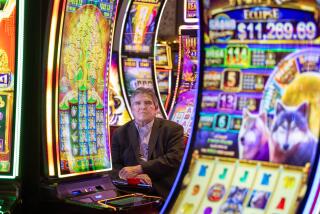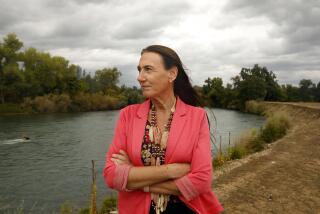On a Roll : Deadwood Bets on Gambling to Revive Gold Rush Town
- Share via
DEADWOOD, S.D. — Legal, casino-style gambling returned to the Midwest at high noon Wednesday in this Black Hills gold rush town where Wild Bill Hickok was killed as he played poker more than a 100 years ago.
A bartender dressed as Hickok and a slot machine parlor manager dressed as Deadwood legend Calamity Jane signaled the start of gaming by walking down the center of Main Street firing six shooters into the air.
Slot machines immediately began turning, and in less than a minute Evelyn Klocko of Deadwood won a $30 pot. Marlene Staub of nearby Central City won the first big slot payoff--$250. Meanwhile, dealers with liquid smooth motions flipped blackjack hands at tables covered with green felt, and poker players flipped chips in games of stud.
Deadwood joins Nevada and Atlantic City as the only places in the continental United States to offer casino-style games, although gambling in Deadwood is limited to poker, blackjack and slot machines, and there is a $5 cap on each raise in the card games.
The return of gaming to Deadwood, where law enforcement officials shut down the last gambling house in 1946, may be the beginning of a new way for America to think about its Midwest and for the region to view itself. Depicted in film and literature as a museum for red, white and blue values, Midwestern cities and states are increasingly looking to gambling as a cure for economic ills.
On Saturday, voters in depressed Gary, Ind., will cast ballots in an advisory referendum on casino gambling. In Illinois, a behind-the-scenes battle is being fought over legalizing river boat gambling. And Iowa, seeking to attract tourists, will allow low stakes gambling on Missouri and Mississippi river boats in 1991.
In Deadwood, a gambling establishment is not allowed to call itself a “casino.” In fact, gambling must be incidental to another business enterprise. That has led to some unusual combinations.
For example, there is Calamity Jane’s art gallery and gaming house, owned in part by Rue McClanahan, star of TV’s “Golden Girls.” There is a sexy lingerie shop and gambling hall and a taffy factory with a bank of slots. And there is Ron Cox’s Wagon Wheel Gift and Pawn shop with banks of slot machines.
“If they win, they can buy a present,” said Cox. “If they lose, they can pawn a ring. It’s a one stop shop.”
“The only thing we don’t have on Main Street is a funeral home with slot machines,” said Bill Walsh, owner of the Franklin Hotel and a leader of the Deadwood U Bet Committee.
“We wanted gambling to augment what we are and what we’ve been,” said former mayor Tom Blair, who helped to bring gaming back to Deadwood.
Businessmen and civic leaders believe gambling will stop the economic and physical tailspin of this town, which was born in an 1875 gold rush and has been long thought of as a honky-tonk place with a scarlet reputation.
“It’s been a nasty town all its . . . life,” said Gordon R. Pederson, a South Dakota legislator. “It’s a mining town that has gone to seed.”
Deadwood’s decline, local boosters say, began when the gambling houses were shut down. It accelerated in the 1960s when the drinking age was raised to 21, and in 1980 when state and federal agents finally closed down the last of the city’s notorious brothels.
Residents were so incensed that they took to the streets to object to the closings and even now the town plays taps in front of the last building to house a brothel, just to remember the good old days that they hope gambling will begin to bring back.
“Nov. 1 will be the day we start rebuilding Deadwood,” said Mayor Bruce Oberlander. “We were not down and out, but we were on the slide. Gambling will reverse the slide.”
“This will bring economic development not only to Deadwood but also to the Black Hills and to the whole state,” said Joyce Hazeltine, the South Dakota secretary of state.
Although the long-term impact of gambling is uncertain, business was booming Wednesday, despite a howling overnight storm that dumped more than five inches of snow and sent the windchill plunging well below zero.
Police Chief Les Bradley said an hour after gambling began that the town of 2,200 had swelled to more than 5,000 people.
“Most of them are faces I don’t know,” said Bradley as traffic crawled on Main Street, a phenomenon usually reserved for warm days at the peak of the summer tourist season.
There are other signs that the prospects of gambling is already helping to revive Deadwood.
“Raw land has gone crazy, double and tripling in price,” said Ron Island, who heads the local Century 21 real estate office.
“There has been a 50% to 60% turnover of property on Main Street,” said Herb Haist, Deadwood’s city planner. “The impact of gambling is astounding. It’s a boom town scenario.”
He said he has proposals pending for two convention centers and a townhouse development, all in a city with virtually no new building for the last several years. Houses that used to languish on the market now sell quickly.
Gambling also has a down side, said Haist. “Every problem we had a year ago has been magnified 10 times.” He said there is a critical shortage of parking and an infrastructure that includes water lines built 100 years ago. The city needs streets, new sewers and new walks and curbs.
The city hopes to take in as much as $500,000 a year from gambling--almost a third of its current annual budget. That money is earmarked, by law, for rehabilitation of the downtown historic district, currently the center of gambling activity. To increase its share, Deadwood is even distributing 50 city-owned nickel slot machines around town.
The onset of gambling has also produced a labor shortage from Goldberg’s grocery store and soda fountain (with three slot machines) to the Bella Union bar and gaming house.
“We need 20 dealers and we have about 12,” said Bella Union co-owner John Evers. “This whole town is short over 100 dealers for blackjack and poker.”
The return of gambling has also resulted in widespread rehabilitation of the run-down bars and hotels in town. In fact, the cleanup is so complete that hotel operator Walsh is considering whether he can still call his bar (and gaming house) Dirty Nelly’s.
“It’s not dirty anymore,” said Walsh.
More to Read
Sign up for Essential California
The most important California stories and recommendations in your inbox every morning.
You may occasionally receive promotional content from the Los Angeles Times.













